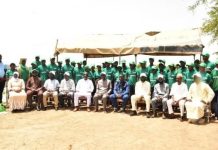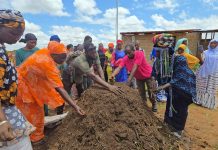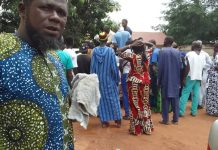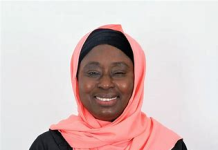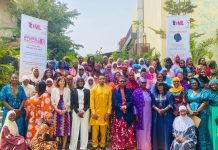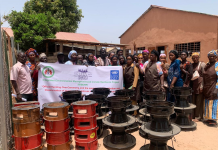WOMEN AND DEVELOPMENT
With Sarjo Camara-Singateh
In this edition of Women and Development our guest is Amie Sillah Sarr. She will share her experiences and understanding of the  State of women in Politics in the Country, what role women can play in politics; what possibilities there are for reform leading to a proportional representation; a way forward and whether or not the Gambia can emulate other countries to form a women’s situation room during elections.
State of women in Politics in the Country, what role women can play in politics; what possibilities there are for reform leading to a proportional representation; a way forward and whether or not the Gambia can emulate other countries to form a women’s situation room during elections.
Mrs. Amie Sillah-Sarr stated that whoever women support tends to win since they constitute a significant voting block but that the challenge is the fact that more often than not they vote on sentiments and tend to be guided by political patrons/patronesses.
She also indicated that under patriarchy few women sought political office. Similarly, in The Gambia the amendment of the elections Act makes it impossible for women to stand in elections unless they are sponsored considering that the deposit for presidential candidates has now been increased to D500, 000 from D10, 000 in the past; and the deposit for the National Assembly elections has gone up to D50, 000 from D5000 in the past; Councils from D2, 500 to D10, 000. The fundamental question that can be posed here is as follows: Which candidate female or male can now stand for an elective office without being sponsored? This means that now capable women/men, youth and people with disabilities will be denied the right to serve their country in elective positions for want of money to do so. We need to repeal the new law to enable all categories of people to compete for elective positions in an all-inclusive process.
She posited that her Party’s constitution makes it a principle to select candidates based on a gender parity where interested persons apply to a committee of equal number of men and women in the district /constituency/nation, who conduct the process in a primary and winning nomination through a debate if a contestant does not have the majority of votes backing him/her.
Some women lament that some processes are dominated by men and few women wh9ch has discouraged a lot of women with the exception of the defiant ones who go for the independent ticket and do sometimes win the elections.
Some women also complain of harassment when their opinions differ with their opponents within Parties; the imbalance political arena tends to favour incumbency and only strong candidates seem to survive the political heat.
Personal misfortune, as well as family ones, tends to be used against women politicians. Character assassination, insults, ‘kitchen sink politics’ are most of the time used by candidates who don’t have programmes, issues and policies to create their own narratives in view of throwing off balance candidates with programmes and policies. However women vying for political should be focused and refuse to be drawn into non issues and frivolities; that they should spell out their programmes and policies, as well as structures they want to create to execute their mission and vision. They should be part of the electorate and live like fish in water among them. Our people say fish cannot live outside water; that a fish’s strength is water.
Women’s participation is vital as a woman brings in her own narrative and if she is determined to serve her people, she will empathize with the poor and downtrodden and if such a group is given due consideration, the whole of the women folk will be on board.
Mrs. Sillah – Sarr said as women who want to vie for political office, they should promote sovereignty, because the irony in Africa, as well as in many nations, is that we have achieved the goal of national sovereignty without having sovereign people. People should know that they are sovereign and that their vote is their voice and their strength and they should be well informed to know whom to vote for based on his/her programmes and policies which are designed to help achieve the goals of development in all its ramifications.
Also, that their vote is responsible for their poverty, ignorance, indignity and non-liberty; that if they want liberty, dignity and prosperity, they should vote wisely and maturely; that voting for a person means you are giving him/her power to determine your life in liberty, dignity and prosperity, or to create a life of poverty, indignity, servitude, disease and early grave for you.
She said that to increase the number of women in the elective positions, the regime of the day has to have the political will to introduce serious reforms such as proportional representation in all the elective positions at the level of Cabinet, National Assembly, the Councils and the VDCs. It is also important that they repeal the amendment of the elections Act to make elections more inclusive.
“My Party’s Constitution advocates one third Gender parity in the cabinet and in all the elective Institutions, from the National Assembly to Councils and the VDCs. Disability will be mainstreamed in the process.
“First Past the Post is very difficult for candidates, especially women under patriarchy, and when the political field is uneven and tilted to favour incumbency,” she said.
Mrs. Amie Sillah also stated that gender does not mean female sex, that to be gender sensitive means advocating for those programmes, structures and policies, as well as creating structures to ensure that gender issues affecting men/women, boys/girls, disability of every cue and description are addressed to positively impact upon the lives of people in their communities and transforming their lived realities.
“For example, rural women want a life of liberty, dignity and prosperity, how can a gender sensitive person, seeking elective position, make it a reality for them? To free them from the drudgery of the back breaking hoe and introduce labour saving devices in the farm; to free them from the drudgery of the home to free them from the strenuous mortar and pestle, the drudgery of drawing water from very deep wells where horses are used to get water, or drawing water from contaminated pools, ponds, streams or river.
“The creation of jobs and jobs that can sustain life for urban women, adequate housing facilities for everybody, good schools and other learning institutions, good hospitals, clinics, health centres to cater for them when they get sick, clean environment free from parasites and disease, good road infrastructure for free movement of goods and services.
“Good governance for liberty and dignity.
“That is what the person vying for political office should tell the electorate to have meaning in their lives.”
“Activists should be part of the struggle to create Women Situation Rooms during elections to ensure that women come out to vote and vote freely for their choice without harassment and in peace,” she concluded.




